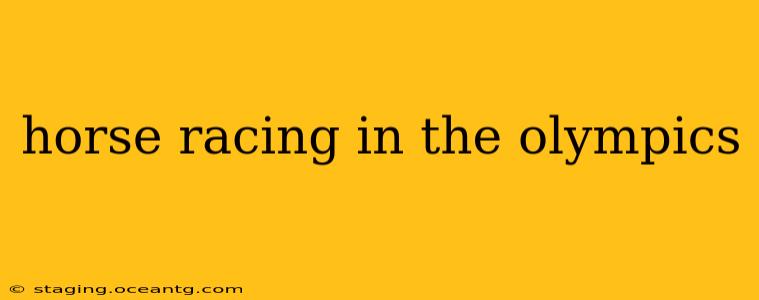Horse racing, a sport steeped in tradition and excitement, holds a captivating place in global sporting history. While it's not currently an Olympic event, its absence sparks debate and raises intriguing questions about its potential inclusion. This article delves into the historical relationship between horse racing and the Olympics, explores the reasons behind its exclusion, and examines the arguments for its potential return.
Why Isn't Horse Racing an Olympic Sport?
This is perhaps the most frequently asked question surrounding the topic. The International Olympic Committee (IOC) has strict criteria for including sports in the Olympic Games. These criteria focus on factors like global participation, popularity, and alignment with the Olympic values. While horse racing boasts a global following and a long and rich history, several factors have contributed to its exclusion:
-
Governance and Inclusivity: The fragmented nature of international horse racing governance presents a significant challenge. Unlike sports with a single, unified international federation, horse racing is governed by numerous regional and national bodies, making unified Olympic representation difficult. Furthermore, the significant cost barrier to entry excludes many nations from participating at a high level, hindering true global inclusivity.
-
Animal Welfare Concerns: The ethical considerations surrounding the welfare of racehorses are a major concern for many, raising questions about the compatibility of the sport with the Olympic spirit. Concerns about potential injuries and the pressure placed on these animals are frequently raised in discussions about horse racing's suitability for the Olympic stage. The IOC is increasingly focused on promoting ethical and sustainable sports.
-
Existing Olympic Equestrian Events: The Olympics already include equestrian disciplines such as dressage, eventing, and jumping. The presence of these events, which also involve horses, might be perceived as sufficient representation of equestrian sports within the Games, reducing the perceived need to include horse racing.
What Equestrian Events Are in the Olympics?
The Olympic equestrian events offer a diverse range of disciplines showcasing the unique partnership between horse and rider:
-
Dressage: A test of horsemanship, elegance, and precision, dressage involves performing choreographed movements in an arena.
-
Eventing: A demanding combination of dressage, cross-country, and show jumping, testing both horse and rider's versatility and endurance.
-
Jumping: A test of athleticism and skill, jumping involves navigating a course of obstacles within a set time limit.
These equestrian sports are governed by the Fédération Equestre Internationale (FEI), a single unified body, simplifying the organizational aspects of Olympic inclusion.
Could Horse Racing Ever Be an Olympic Sport?
While it’s unlikely in the near future, the possibility of horse racing's inclusion isn't entirely out of the question. Significant changes would need to occur, however, including:
-
Unified Governance: A single, internationally recognized governing body for horse racing would need to be established to streamline the process of Olympic participation.
-
Addressing Animal Welfare Concerns: Implementing and enforcing strict animal welfare standards would be crucial to alleviate ethical concerns and demonstrate commitment to responsible sportsmanship.
-
Increased Global Participation: Efforts to make horse racing more accessible and inclusive globally, reducing the significant cost barriers to entry, would help solidify its case for Olympic inclusion.
Is Horse Racing Cruel to Horses?
The question of cruelty is a complex one, sparking passionate debate. Proponents of horse racing highlight the care and attention given to these animals, emphasizing the close bond between horse and trainer and the extensive veterinary care provided. However, critics point to the inherent risks of racing, including the potential for injury and even death, alongside concerns about training practices and the pressure placed on horses to perform. The truth, likely, lies somewhere in between, dependent heavily upon the standards of care and oversight within a specific racing jurisdiction. Responsible and transparent regulation is paramount to mitigate risks and ensure horse welfare.
What Are the Biggest Horse Races in the World?
Several prestigious horse races attract global attention and are considered among the most important events on the racing calendar. These include the Kentucky Derby (USA), the Epsom Derby (UK), the Prix de l'Arc de Triomphe (France), and the Melbourne Cup (Australia), each with its unique history and cultural significance. These races showcase the global appeal and sporting prowess inherent in thoroughbred racing.
In conclusion, while horse racing's absence from the Olympic Games is understandable given the current circumstances, the debate surrounding its potential inclusion highlights the need for ongoing dialogue about the future of the sport and its compatibility with the evolving values of the Olympic movement. Addressing the key challenges of governance, animal welfare, and global participation will be crucial in determining its long-term prospects for inclusion in the world's most prestigious sporting event.
